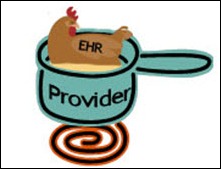The article about Pediatric Associates in CA has a nugget with a potentially outsized impact: the implication that VFC vaccines…
DOCtalk by Dr. Gregg 12/28/12
An EHR in Every Pot?
As 2012 — the second full year of Meaningful Use — winds down, perhaps a little reflection on the whole drive toward digital data from the “grunt in the trenches” perspective is in order. (Well, if not ordered, at least I’ll try to keep from being disordered.)
If you saw any of or heard much about the recent ONC 2012 Annual Cheerfest … er … Meeting, you know that lots of people across all parts of healthcare’s realm have been busily adopting and implementing and cashing in MU checks. Don’t get me wrong. I’m a fan. I’m not knocking the whole hoopla that ONC orchestrated to showcase the progress that MU incentives have helped drive forward. The meeting was a bit cheerleader-ish, sure, but with so many folks questioning what has come from this enormous investiture, it was probably warranted as a “team” rally, as a way to spotlight what has come forth from all the HITECH seeds that have been sown.
Healthcare appears to have crossed the tipping point for digitization. And, there is a fair case to be made that MU incentivization was one of the prime successful drivers pushing us over that peak. Lots of people – from providers to vendors to political appointees – are cheering all the way to the literal or figurative bank about this fact.
However, not everyone is rooting “Rah, Rah” for EHRs, especially not in the small grunt trenches. Recent numbers have shown that the drive toward digital has been prompting a provider exodus from private and smaller independent practices. Regulations and costs, many related to HIT adoption, are being blamed as primary causes for the 57 percent to 39 percent decline in the number of docs in private practice over the past 12 years.
Of course, there are still a number of providers out there who are refusing to let go of pen and paper. Many of them are nearing the end of their careers and the daunting challenge of transitioning from decades of ingrained workflow habits just doesn’t make sense. (Personally, I get that. Those folks should be allowed to finish their careers in pressed wood pulp peace.)
But there is also a reversal of sentiments for some as regards EHRs and MU incentivization. Providers may be buying EHR systems, but driving through to MU is another matter. The American Academy of Family Physicians (AAFP) has noted that while attestation for MU has risen dramatically this year, the gap between registration and attestation is significant. By October 2012, of the 225,000 Medicare EPs registered, only some 88,000 had pushed through to attestation. Jason Mitchell, MD, assistant director of the Center for Health IT at the AAFP, says that many family docs have stopped trying to obtain MU incentives “because the hoops they have to jump through are so onerous."
And then, there’s the recent tale I read of a group practice that had gone fully digital only to drop the stylus and revert to pen and paper. They felt their professional satisfaction and provider-patient relationships were far better off without a computer intermediary. (I’ve searched high and low to find the link to this recent story, but have lost it – sorry. If you know of it, I’d love to have you forward the URL.)
While a short term “we can practice better and feel better about how we practice” sentiment can be attained by staying with or reverting to paper and pen, I think this is short-sighted and selfish. Mountains of paper, with often illegible data, obstruct the advance of healthcare knowledge and insights. Going digital is essential if we, as a health system whole, want to improve the healthcare system for all.
Many of you who read the HIStalk family of web pages are more “big guy” oriented as vendors, medical institution affiliates, or larger group practice members. Sometimes when I read HIT blogs and news, there almost appears to be a single-mindedness about EHRs and MU attainment that encompasses large- and medium-sized provider groups. The little guys don’t seem to be nearly so well considered. Maybe that’s because it’s easier to consider the larger organizations because, overall, that space is easier to address. Going digital is never easy, but it is definitely more doable en masse.
But remember, there’s still a large portion of healthcare being delivered by small, independent providers, and these folks are finding the EHR parade and MU bandwagon difficult to join. The stressors are driving some away from independence, some away from digital, and some — though they are going digital — are forgoing the incentives to MU.
Personally, I don’t want to see all the small practices subsumed by ACOs or every provider owned by a health system conglomerate. I believe there’s value in the variation and that some care is better handled outside of a corporate structure. And I believe all of us will be best served once everyone can truly share health data. That is when there will be true meaningful use, incentivized or not.
But the little guys need better solutions, solutions that fit their situations and that aren’t just trimmed down versions or barebones models of systems designed for bigger players. I’m not just talking HIT solutions. They need easier entry to the EHR world and fewer hoops through which they must jump.
Will there eventually be an EHR in every pot, so to speak? Yes. Not yet, but it will happen. I just hope it happens before too much backlash and too much frustration drives to extinction the small, independent provider practices. The care they provide is valuable to many, many folks who enjoy the more intimate setting and services they provide.
From the trenches…
“…Put the proverbial ‘chicken in every pot.’ And a car in every backyard, to boot.” – Republican National Committee advertisement, 1928 (Herbert Hoover never actually made such a promise, though he often receives attribution.)

Dr. Gregg Alexander, a grunt in the trenches pediatrician at Madison Pediatrics, is Chief Medical Officer for Health Nuts Media, an HIT and marketing consultant, and sits on the board of directors of the Ohio Health Information Partnership (OHIP).

